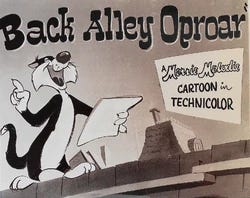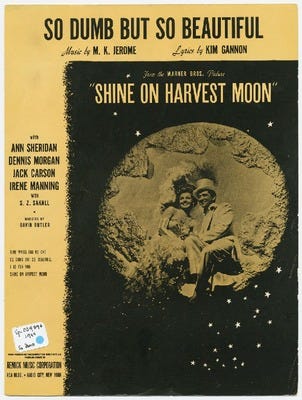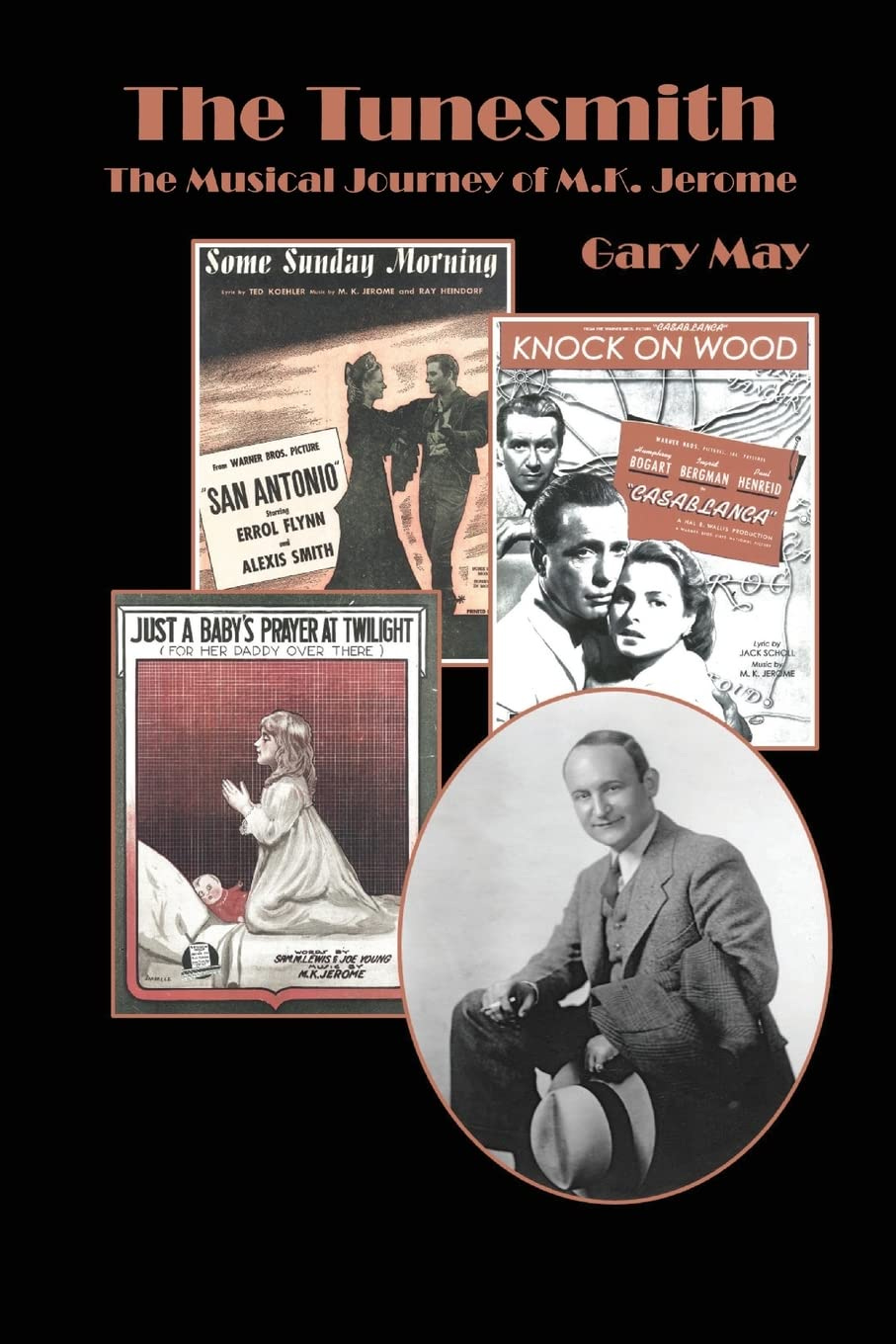(recap from yesterday)
If you aren’t familiar with the composer Maurice Jerome, you aren’t alone. He spent most of his career writing songs for lesser films at Warner Bros., and only occasionally placed a number in a top picture like Casablanca. (No, he didn’t write “As Time Goes By,” he wrote the other song Dooley Wilson sings in the movie, “Knock on Wood,” which I’ve always loved.)
But here’s the funny thing: dozens of his songs are known to folks of my generation through their placement in cartoons, as I elaborate in the essay below.
In recent years, “Moe” Jerome is at last getting some attention: a few months ago, his grandson, Gary May, wrote the biography of the songwriter, which he has poetically titled The Tunesmith: The Musical Journey of M.K. Jerome (available on Amazon).
Even more notably, the legendary singer-songwriter James Taylor included one of Jerome’s songs, “Easy as Rollin’ off a Log,” on his 2020 album, American Standard. It turns out that Taylor - who was said to be inspired to write his classic “Sweet Baby James” by Jerome’s 1937 western lullaby, “My Little Buckaroo” - also grew up learning songs, both classic and obscure, from watching old cartoons on television. Who knew?
(This essay is my contribution to The Tunesmith. my thanks to Gary May for encouraging me to also publish it here. This week (Saturday September 16) on Sing! Sing! Sing! I’m doing a special tribute to Moe Jerome and his songs, from the teens to the 1950s, including an interview with Gary. Info on how to tune in to Sing! Sing! Sing! may be found below, or for an advance listen, click here. Very special thanks to Elizabeth Zimmer for her invaluable and much-need proofreading.)
“Part Two: One Moe Time”
Back Alley Oproar (1948) was released only ten years after My Little Buckaroo and by the same director, Friz Frelen - but what a difference. With My Little Buckaroo, Warners and Witmark wanted an animated vehicle to push the song, but Freleng and the Merrie Melodists delivered a mild comedy instead. Back Alley, however, gives us Friz at the height of his directorial and storytelling powers - and his considerable gift for comedy. The same can be said for Carl Stalling, the animation studio’s musical director and the greatest of the Looney Tunesmiths. Rather than having to choose between a musical and a comedy, this 1948 mini-masterpiece is a brilliant example of how to do both at the same time, and shows how the music and comedy both support, rather than compromise, each other.
The plot is easily reduced to a single sentence: as the eternally-aggravated Elmer Fudd tries to sleep, Sylvester is determined to keep him awake by singing on the back fence. The cat delivers an extremely ambitious, concert-level performance that goes on all night and includes everything from love songs to military marches to brash-and-bouncy upbeat numbers to operatic trilling by a lyric soprano in female form.
Jerome’s songs play a key role throughout Back Alley Oproar. Over the main titles, we hear Rossini’s overture to his 1816 opera Il barbiere di Siviglia (The Barber of Seville) which announces that we are about to experience something larger than life and grandiose. (Sylvester’s first number is a cartoonish adaptation of “Largo al Factotum,” the famous “Figaro” aria, which seems appropriate for a cat, at least after Pinocchio.) After the credits, the first notes we hear are of “Sweet Dreams, Sweetheart” as we see Elmer preparing for bedtime. As we know, this was written by Ted Koehler and Jerome as a love theme for Hollywood Canteen (1944), but Stalling clearly heard it as more of a lullabye than a romantic theme. Bugs Bunny had already performed it for the same purpose at the start of Hair-Raising Hare (1946), as he too readied himself for slumber.
After two classical excerpts, the aforementioned “Figaro” and a rather audacious vocalize adaptation of Liszt’s Second Hungarian Rhapsody (a perennial go-to piece for both Freleng and Stalling), the first pop song we hear is “Some Sunday Morning,” written for San Antonio, a 1945 Western starring Erroll Flynn and Alexis Smith. In the picture, Smith sings it via the pre-recorded voice of Bobbie Canvin, although there’s a spoken patter section in the middle (which seems to be Smith’s actual voice) that was apparently inserted to give the song more western content. (That monologue doesn’t appear in any of the commercial recordings, i.e. by Dick Haymes and Helen Forrest, Louis Prima, or Hal McIntyre.)
In Back Alley Oproar, we only get to hear eight bars of “Some Sunday Morning” but it is nothing if not memorable - with a couple of judicious pauses, it lasts about 30 seconds yet incorporates two of the best gags in the short. Elmer is in bed when Sylvester (Mel Blanc) starts singing “Some Sunday morning is going to be / Some Sunday morning for someone and me.” Repeating a gag that Stalling and Freleng had used in an earlier version of this story (the 1941 Notes to You), Elmer then picks up the nearest book, which happens to be the novel The Thin Man by Dashiell Hammett, and hurls it out the window at the cat. But then, as he walks away, a book is thrown back through the window at him, and we can see it’s Return of the Thin Man. (Note to literary scholars: there actually was no such book, but it’s funny just the same.)
We immediately hear Sylvester singing the third line of the song, “Bells will be chiming an old melody, ‘specially for someone….” whereupon the melody reaches another fermata - a brief pause, whose duration is determined by the conductor - while Elmer violently slams down the window, so we can’t hear the cat. But just then, the phone rings (“bells will be chiming…”) and Elmer runs to the phone, which is in a booth. (This Indicates that he’s apparently living in a boarding house where there’s a phone only in the hallway, not in the private rooms.) He picks up the phone just in time for the last two words, “....and me!” The timing is perfect, the joke is hysterical and the song is also put over brilliantly. I’m sure many viewers left the cartoon looking for a record of “Some Sunday Morning” even if it was three years later by then. I know that I did.
# # #
(Below: A 1941 soundie of one of Moe’s comedy hillbilly numbers. Thank you Mark Cantor for reminding me that several of Moe’s songs were used for soundies. This has to be the funniest and most lighthearted song ever about what is, essentially, a lynching. Bravo Esmereldy! This week on Sing! Sing! Sing! I play this song by Ozzie Nelson and on a legit country record supplied by the great Doctor Demento, aka Mr. Barry Hansen.)
By Jerome’s standards, one imagines that the most successful placement of any of his songs in a cartoon - in the very long run at least - was certainly “As Easy as Rollin’ off a Log” in Katnip Kollege (1938). This is the major instance of one of his songs being truly plugged, sung on screen, all the way through, for what amounts to a major animated production number.
In the 1930s, Jerome wrote mostly for Warner’s B pictures, like The Captain’s Kid (1936), starring the oldest and youngest performers under contract to the studio, Guy Kibbee and precocious seven year old British child star Sybil Jason, and Over The Goal (1937), with Johnny “Scat” Davis. Davis was a trumpeter-singer-comic and funster in a vaguely Louis Armstrong / Louis Prima mold who was under contract to Warner’s in the early swing era, who was memorable in small roles in A-pictures like Hollywood Hotel and bigger parts in smaller movies like Garden of the Moon and Over the Goal. (Ironically, Jerome wrote songs for some of the more obscure films produced and released by Warner Bros., but, conversely, also one of the most celebrated movies in the history of cinema, when he penned “Knock on Wood” and “Dat’s What Noah Done” for Dooley Wilson to sing in Casablanca.)
As Gary writes in this biography of his grandfather, Jerome wrote the song for a another Warner B picture, Over the Goal (1937) in which it was sung by Johnny “Scat” Davis, a trumpeter-comedian-entertainer-singer who enjoyed a spurt of popularity in the early swing era. Apparently, the original intention was for the “Rollin’” to be heard twice in the picture, once as kind of a throwaway in which Davis sings along with the song on the radio, then again as a fuller production number, a duet between Davis and the zany comedienne Mabel Todd, who later went on to a different kind of fame when she teamed up professionally and personally with Morey Amsterdam.
In the final film, the “bigger” version of the song was cut, leaving only the brief, 30-second “throwaway” performance. It was possibly at the suggestion of the publisher that the unused soundtrack recording was gifted to the Schlesinger operation, and they built the second half of the cartoon around it. Scholar and singer Michael Feinstein has located a copy of that original pre-record; it consists of a verse and then a fast first chorus sung by Davis, followed by a tempo change, then a slightly slower chorus sung mostly by Todd (she adds a few pick-up notes at the start, “I know that it’s as easy…”), with Davis joining in or taking over in several spots. Then there are eight bars or so of instrumental, before Davis comes back in and sings the last two lines, “What else could I do? It’s so easy to fall in love with you.” The cartoon version cuts the verse but adds a brief trumpet solo, apparently played by Davis (though not in the Feinstein track) very much in the Louis Armstrong / Louis Prima style of 1937.
Essentially, Katnip Kollege is, in fact, less like a Warner’s cartoon - especially as we would come to know them by the 1940s - and more like a mid-’30s Vitaphone two-reel featurette, like the many starring the underrated song-and-dance man Hal LeRoy. The short is, on the whole, short on the humor we associate with Looney Tunes but heavy on charm, more like a Disney or a Harman-Ising MGM production.
Thus it’s kind of a quirk of fate that “As Easy as Rollin’ off a Log” was essentially cut from the feature picture but used in a cartoon where, as nobody would have suspected in 1937-’38, it would be heard by many more people over the generations. The joke is on everybody that, in the 21st century, a song that was essentially discarded should be the most prominent number from the vast Jerome catalog. When James Taylor included “As Easy as Rollin’ off a Log” in his 2020 album, American Standard, it was indeed an outlier - it’s a great old song from the past, but hardly a standard in the sense that “God Bless the Child” and “Pennies from Heaven,” which are also on the album, are standards.
And that is virtually a literal definition of irony; we had to wait over 80 years to get the premiere recording of a song that many generations of kids had already grown up humming.
For an advance listen to the Moe Jerome episode of Sing! Sing! Sing!, which is airing this Saturday on KSDS San Diego (more info below) click here.
Disclaimer: These are my memories of these incidents, nothing more, nothing less. I apologize in advance in case they may not line up precisely with anyone else’s account of what transpired on those occasions.
Special Thanks to Elizabeth Zimmer (hooray!) for pitching in and scanning this two-part story for typos, mistakes, and assorted boo-boos!
A mistake all my own: in my quickly-written mini-post on Mel Tormé Swings Shubert Alley, I got one thing seriously wrong - the most-recently-written song on the album is, of course, “All I Need is the Girl,” from Gypsy. My bad.
Sing! Sing! Sing! : My tagline is, “Celebrating the great jazz - and jazz-adjacent - singers, as well as the composers, lyricists, arrangers, soloists, and sidemen, who help to make them great.”
A production of KSDS heard Saturdays at 10:00 AM Pacific; 1:00PM Eastern.
To listen to KSDS via the internet (current and recent shows are available for streaming.) click here.
The whole series is also listenable on Podbean.com, click here.
Wednesday, September 13
7:00PM (EST) - THE NEW YORK ADVENTURE CLUB presents:
Legends of Lounge: The All-Time Great Jazz Pianist-Singers
Webinar
click here
Wednesday, September 13
9:30PM (EST) - Will Friedwald's CLIP JOINT presents:
THE MEL TORME 98TH BIRTHDAY SPECIAL
no cover charge!
click here
Four Episodes of Sing! Sing! Sing on KSDS (88.3 San Diego) spotlighting the life and legacy of Tony Bennett:
SSS 59 2023-08-12 Tales of Tony
SSS 58 2023-08-05 Tony Bennett sings the George & Ira Gershwin Songbook
SSS 57 2023-07-29 Tony Bennett - Van Heusen, Burke, Cahn, Styne, Sondheim, Comden & Green
SSS 5 2022-07-30 Tony Bennett @ 96: The Johnny Mercer Songbook
SLOUCHING TOWARDS BIRDLAND is a subStack newsletter by Will Friedwald. The best way to support my work is with a paid subscription, for which I am asking either $5 a month or $50 per year. Thank you for considering. Word up, peace out, go forth and sin no more!
Note to friends: a lot of you respond to my SubStack posts here directly to me via eMail. It’s actually a lot more beneficial to me if you go to the SubStack web page and put your responses down as a “comment.” This helps me “drive traffic” and all that other social media stuff. If you look a tiny bit down from this text, you will see three buttons, one of which is “comment.” Just hit that one, hey. Thanks!






Loved these two essays. Brought back some memories and added much to them. Thank you!
Excellent analysis. Nothing beats the Warner animators at the top of their games.